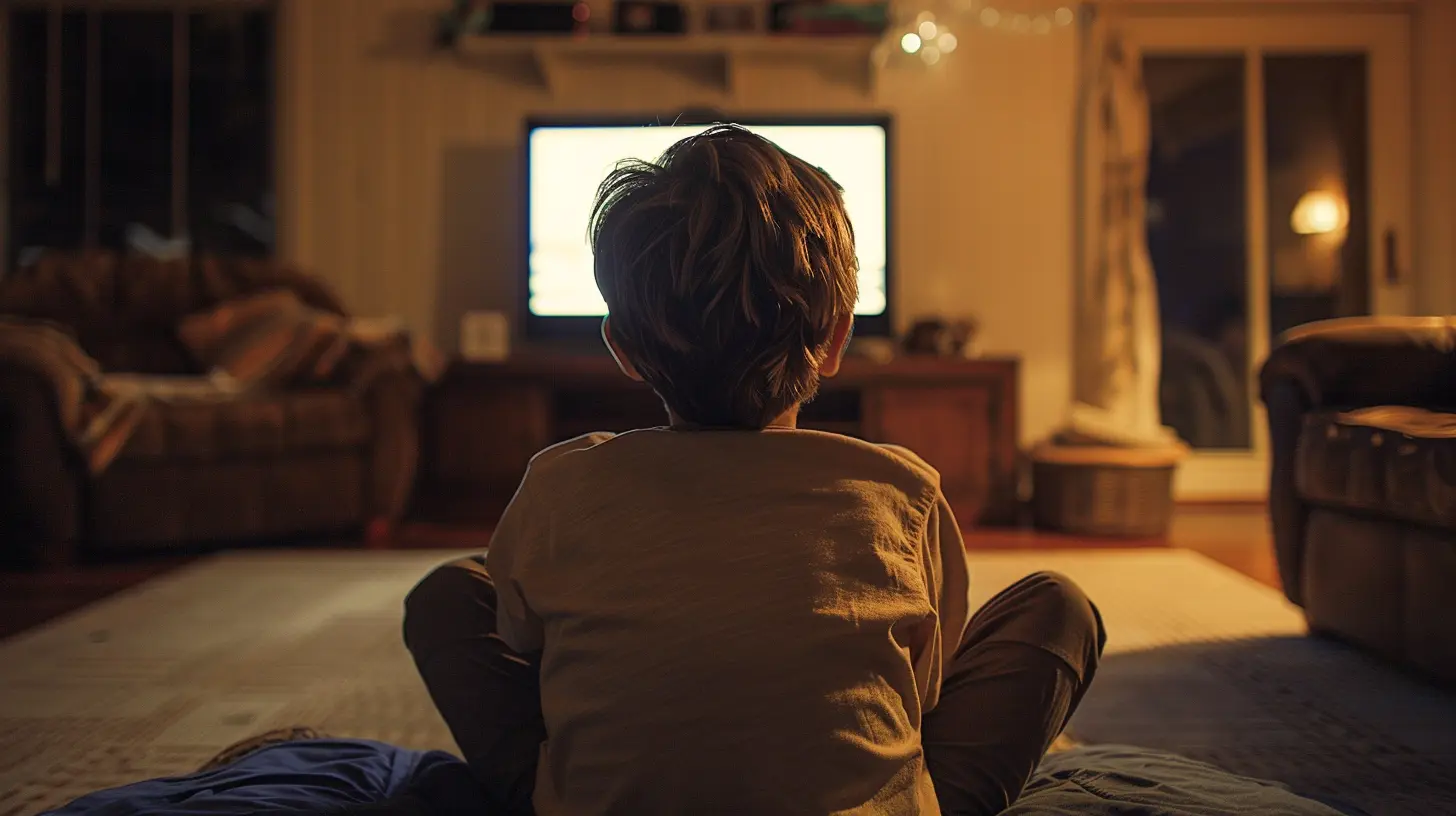Parenting in the Digital Age: Setting Screen Time Boundaries that Work
21 January 2025
In today's fast-paced digital world, there's no denying that screens have become an integral part of our daily lives. From smartphones to tablets, laptops, and TVs, it's almost impossible to escape them. As parents, we all want the best for our kids, but sometimes, the digital world can feel like a minefield. How much screen time is too much? When should kids have access to devices?
Sound familiar? You’re not alone.
The tricky part of parenting in the digital age is knowing how to set boundaries that actually work for your family. Every child is different, and what works for one might not work for another. But don't worry—today, I’m going to break down some workable strategies for managing screen time, while still allowing your kids to explore the wonders of today's technology without losing their way in the digital jungle.

Why Does Screen Time Matter?
Before we dive into strategies, let’s take a second to understand why managing screen time is important. Sure, screens can be a great way to learn and entertain, but overexposure can have some downsides too.The Effects of Excessive Screen Time
We all know too much of anything can be a bad thing, and screen time is no exception. Here are just a few of the negative effects associated with too much exposure:- Sleep issues: Blue light from screens can interfere with your child's ability to fall asleep.
- Poor concentration: Constant screen usage can reduce a child’s ability to concentrate on things that require sustained attention.
- Lower physical activity: More time on screens means less time moving around, which can lead to lifestyle-related health issues down the road.
- Social skill setbacks: While online interactions are a big part of today’s communication, they don't fully replace the value of face-to-face conversations.
So while we can’t shove all the gadgets into a drawer forever, we do need to be mindful of how much time our kids spend plugged in.

The Million-Dollar Question: How Much Screen Time is Right?
Every kid is different, but the American Academy of Pediatrics (AAP) offers some helpful guidelines. Here’s a rough breakdown:- For children under 18 months: Zero screen time, except for video chatting. (A.k.a., FaceTiming grandma is totally okay.)
- For toddlers (18-24 months): Some screen time, but ONLY when a parent is co-viewing. This means you’re watching alongside them, helping to explain or engage with what they see.
- For kids aged 2-5 years: Keep screen time to about one hour per day of high-quality programming. Think along the lines of educational apps or shows.
- For children 6 and older: The goal is to balance screen time with other healthy habits—like sleep, physical activity, and face-to-face socializing.
Notice how these guidelines emphasize quality over quantity. Plus, it’s not just the amount of time in front of a screen that matters, but also what they’re doing on those screens. Educational content? Great. Mindless scrolling? Not so much.

Setting Realistic Screen Time Boundaries
Here’s where things get tricky—how do you set screen time limits without sounding like the fun-police? Here are some tried-and-true tips for creating realistic and effective boundaries:1. Lead by Example
Let’s be real—kids are copycats. They watch everything you do, sometimes even more than they listen to what you say. So, if you’re glued to your phone or your tablet, guess what? They’ll want to be too.Instead, try modeling the behavior you want to see. Want them to put their phone down during dinner? You should too. Establishing family-wide tech-free times, like during meals or before bed, can set the right tone for the whole household.
2. Create Tech-Free Zones
Speaking of tech-free times, let’s make some tech-free zones as well. Bedrooms, dinner tables, and family hangout spots are great candidates for this. When you create spaces dedicated to being unplugged, it helps your child understand that not every moment needs to be filled with digital entertainment.And don’t just limit this to kids—apply it to the whole family. This can foster better in-person connections and make non-screen time feel like a normal part of life rather than a punishment.
3. Set Clear Rules and Stick to Them
Consistency is key. Decide on rules and make sure they’re clear to everyone in the house. For example, you might set a rule like “No screens for an hour before bedtime” or “Only one hour of game time on school nights.”Once these rules are in place, stick to them! Kids are experts at pushing boundaries, so it’s important to stay firm. But flexibility is important, too—if there’s a special event like a family movie night, it's okay to bend the rules every now and then, just as long as it doesn't become a habit.
4. Use a Timer or Parental Controls
One simple but effective solution is setting a timer to keep track of your child’s screen time. Many devices even come with built-in parental controls that allow you to limit the time spent on various apps or activities.Once the time is up, the device locks, or a notification is sent. This takes the pressure off you as the enforcer, allowing the device itself to do the heavy lifting.
5. Offer Alternatives to Screen Time
Let’s face it—kids grab their tablets when they’re bored. So part of reducing screen time is providing alternative activities that are just as fun:- Go outside and play.
- Get crafty with art supplies.
- Encourage reading with books they love.
- Do puzzles or board games as a family.
By providing engaging, offline options, you help your child see that they don’t always need a screen for entertainment.
6. Involve Your Kids in the Discussion
Here’s a lightbulb moment: involve your kids in setting their own screen time limits. This doesn’t mean they get to decide everything, but having some say in the process can make them more likely to stick to the boundaries you establish together.Sit down and talk with them. Explain why balance is important, and ask for their input. By doing this, they’ll feel respected, and you’ll have a better chance of gaining their cooperation.

Helping Kids Develop a Healthy Relationship with Technology
Limiting screen time is just one part of the puzzle. Teaching kids to have a healthy relationship with technology is equally important. After all, screens and devices aren’t going anywhere. The goal isn’t to eliminate technology but to empower your child to use it wisely.1. Encourage Mindful Usage
Help your kids understand the difference between passive viewing and active or productive use of screens. Watching YouTube videos for hours? Passive. Designing a website, creating a digital art project, or using a learning app? That’s active use.Teach them to ask, “Why am I using this?” before turning on a device. If they’re using it just to kill time, encourage them to find something else to do.
2. Monitor Content
Content matters as much as time spent on screens, if not more. As a parent, it’s your job to ensure that your child is engaging with age-appropriate, high-quality content. Use parental controls and check their activity regularly. The internet is vast and not all of it is suitable for young minds.Keep your kids safe by ensuring they’re on educational websites or playing games that stimulate creativity or learning.
3. Emphasize ‘Digital Diets’ Over Restrictions
Think of screen time like food. A balanced diet is better than a constantly restricted one. Instead of adopting an all-or-nothing approach, focus on balance. Encourage a mix of different types of screen time: educational, creative, social, and yes—sometimes even a little fun, mindless entertainment.When kids understand that screen time can be part of a healthy routine, they’re more likely to use technology responsibly.
The Role of Schools in Tech-Savvy Parenting
Most schools now use digital tools for learning, so a significant portion of your child's screen time may be education-related. This makes monitoring screen time more complex but also opens up opportunities.Talk to Teachers
Don’t hesitate to communicate with your child’s teachers to understand how much screen time they're getting during school hours. Discuss strategies for balancing this with recreational screen time at home.Encourage Tech Literacy
Schools also play a role in enhancing tech literacy. Help your child understand that technology isn’t just for games or videos. Encourage them to explore educational technology platforms, coding, or design programs. This fosters a more constructive relationship with screens and turns technology into a tool for learning and growth.
Technology-Free Time: How to Unplug the Whole Family
It’s no small feat to unplug in a world where we’re all constantly connected. But having family-wide screen breaks is a great way to create balance.Try ‘Screen-Free Sundays’
Incorporating a designated day, like “Screen-Free Sundays,” can help everyone unplug together. Use this time to enjoy activities like outdoor adventures, cooking together, or simply lounging with a good book.Encourage Real-Life Socializing
It’s important for kids (and adults) to connect with people face to face. So, encourage your children to spend time with friends in person, rather than always chatting over games or social media.Conclusion: Progress Over Perfection
Managing screen time in the digital age isn’t easy, but it’s totally possible. Remember, it’s not about achieving perfection; it’s about making steady progress and fostering a healthy relationship with technology. By setting clear boundaries, offering alternatives, and leading by example, you can help your child navigate the digital world in a balanced and healthy way.And above all, remember: we're all figuring this out as we go. Don’t be too hard on yourself if the screen time battle isn’t always perfectly executed. Celebrate the small wins, stay flexible, and keep the conversation open with your kids.
all images in this post were generated using AI tools
Category:
Parenting SupportAuthor:

Tara Henson
Discussion
rate this article
13 comments
Phoebe Hodge
Thank you for this insightful article! Navigating screen time can be challenging, but your practical tips and understanding of balance truly resonate. It's comforting to know we're not alone in this journey, and small changes can make a big difference.
March 31, 2025 at 2:31 AM

Tara Henson
Thank you for your kind words! I'm glad you found the tips helpful. Navigating screen time is definitely a shared experience, and every small step counts!
Thalia Benton
“Ah, parenting in the digital age—where ‘screen time’ sounds like a high-stakes negotiation with a tiny, snack-fueled diplomat! Remember, it’s all about balance: a little YouTube can lead to big smiles, but too much might require ‘intervention’… or a timeout in the toy box!”
February 23, 2025 at 5:19 PM

Tara Henson
Absolutely! Finding that balance is key—embracing the positives of technology while ensuring our little ones don’t lose out on imaginative play and real-world connections.
Layne McLain
Great insights! By setting thoughtful screen time boundaries, we empower our kids to thrive in both the digital world and real-life relationships. Keep it up!
February 7, 2025 at 3:36 PM

Tara Henson
Thank you! I'm glad you found the insights helpful. Balancing screen time is crucial for healthy development!
Jasmine McIlroy
Great insights on navigating screen time! Establishing boundaries can feel challenging, but your practical tips empower parents to create a healthier digital balance for their kids. Remember, it’s all about fostering connection and ensuring technology enhances, rather than replaces, real-life interactions.
January 31, 2025 at 4:51 AM

Tara Henson
Thank you! I'm glad you found the tips helpful. Striking that balance is essential for healthy connections in our digital age.
Zeno Hudson
Ah, the digital jungle! 🦖 Navigating screen time feels like teaching a cat to fetch—confusing yet essential! Remember, balance is key: let them explore the virtual wild while saving time for real-world dinosaur hunting and spontaneous dance parties in the living room!" 🎉💻
January 30, 2025 at 4:27 AM

Tara Henson
Absolutely! Finding that balance between digital exploration and real-world activities is crucial for healthy development. Let's embrace the chaos and create joyful experiences both online and offline! 🦖🎉
Hugo Stevens
Setting screen time boundaries is like trying to eat just one potato chip—easier said than done! But with a sprinkle of creativity and a dash of compromise, we can turn tech time into family fun. Remember, balance is key, and laughter is the best app for parenting!
January 29, 2025 at 5:40 PM

Tara Henson
Absolutely! Finding that balance is crucial, and making screen time fun can foster connection while keeping boundaries in check. Great insights!
Aubrey Wright
Empowering our kids with balanced screen time fosters healthier habits and deeper connections! You’ve got this!
January 28, 2025 at 5:14 AM

Tara Henson
Thank you! Balancing screen time is crucial for nurturing healthy habits and meaningful relationships. Together, we can navigate this digital age!
Fleur Larsen
Navigating screen time in today’s digital landscape requires balance and intention. Establishing clear, consistent boundaries fosters healthy habits, encouraging children to engage meaningfully both online and offline.
January 27, 2025 at 3:19 PM

Tara Henson
Thank you for your insightful comment! Striking a balance with screen time is crucial for fostering healthy habits in children. Clear boundaries indeed help cultivate meaningful engagement both online and offline.
Beau Myers
Empower your children with balanced screen time—fostering connection, creativity, and growth!
January 26, 2025 at 5:28 AM

Tara Henson
Absolutely! Finding the right balance in screen time can enhance your children's development while nurturing their relationships and creativity.
Icarus Beck
Great insights! Setting clear screen time boundaries is essential for healthy development. Balance is key in navigating parenting in today’s digital world.
January 25, 2025 at 5:35 AM

Tara Henson
Thank you! I completely agree—finding that balance is crucial for fostering healthy development in our kids.
Theodora McMeekin
This article provides practical insights into managing screen time for kids. It’s important to establish clear boundaries that suit your family's needs, while also promoting open communication about digital use. Great tips to consider!
January 24, 2025 at 4:17 PM

Tara Henson
Thank you for your feedback! I'm glad you found the tips helpful for managing screen time with your family. Open communication is key!
Yazmin Turner
Stop making excuses! Embrace clear boundaries for screen time—your child’s future depends on it.
January 23, 2025 at 4:09 PM

Tara Henson
Thank you for your input! Setting clear boundaries is essential for healthy screen time habits and supporting our children’s futures. Let’s prioritize balance together!
Casey McGinn
Great insights! Setting screen time boundaries can feel overwhelming, but it's all about balance and communication. Thanks for sharing practical tips that make navigating the digital world a little easier for us parents!
January 21, 2025 at 5:18 AM

Tara Henson
Thank you! I'm glad you found the tips helpful. Balancing screen time is certainly a journey, and communication is key!
MORE POSTS

Creating a Calming Bedtime Routine for Restful Nights

How to Encourage Creativity in Your Child's Daily Life

Baby Milestones: What to Expect in the First Year

How to Identify and Strengthen Your Child’s Unique Talents

How to Strengthen Emotional Regulation in Kids for Long-Term Wellness

Self-Care for Parents in a Blended Family

The Value of Parent Involvement in Extracurricular Activities

Why Homemade Baby Food Can Be a Game Changer

Partner Involvement During Pregnancy: Making It a Team Effort